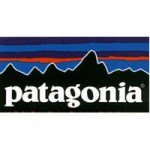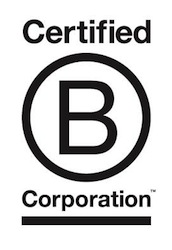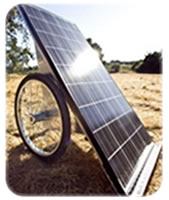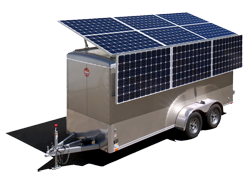Below is a listing of companies that offer green dwellings in the form of modular, prefab/manufactured, compact and/or mobile structures. These days, there are many such options available that are not only green, but also beautiful, well-made, and often low-cost. Some of these structures are homes or cabins/cottages, while others can be used as an addition, a backyard studio, office, in-law unit/guest house, or some other type of “accessory dwelling unit.”

They come in a wide range of sizes, from teeny-tiny one-room spaces (e.g., 100 sq. ft.) and small units (see the Tiny/Compact Structures section below) to conventionally sized homes. They are also available in a wide variety of styles; some have traditional designs, while others have a very modern look. Some are available as plans and/or DIY kits, and others have designated builders. Many can be modified or customized.
Prefab (factory-built) homes have many benefits. They can be built more efficiently (e.g., less material waste), more quickly, with more precision and durability (i.e., higher quality), and they typically have more predictable costs (and often cost less) than site-built homes.
Note: The levels of greenness vary among the following options, but all of them tout some green features.
This is not a comprehensive listing; there are many other companies that make similar types of green structures. I’ve provided links below to other directories that list additional options. If you know of another green modular, prefab, mobile, or small home designer or manufacturer that you would recommend, please share it in the Comments.
Note: The asterisk (*) shown after certain listings indicates that those companies seem to offer at least one low-cost/affordable option. Some of the other companies might also offer such options, but specific pricing isn’t available on all of the websites; in some cases, one must contact the company for pricing information. Scroll down to the second half of the post for a listing of companies that specialize in tiny/compact homes or structures.
Acre Designs (based in CA)
Blu Homes (offices in CA, MA, and MI)
CaliPassiv (based in CA)
Clayton i-house
Clever Homes (based in CA)
Deltec Homes (based in NC)
FabCab
Flex House (by Shelter Dynamics; based in CA)
GreenTerraHomes (based in Canada; steel-framed)
IdeaBox (based in OR)
Jot House *
Lindal Cedar Homes (see Mod.Fab and Lindal Architects Collaborative; Lindal has an international network of dealers) *
Living Homes (based in CA)
Marmol Radziner Prefab (based in CA)
Method Homes (based in WA)
New Old Green Modular Home (from New World Home)
OHOME (Healthy Buildings Technology Group; based in CA)
OMD (Office of Mobile Design; based in CA)
Piece Homes (Davis Studio Architecture + Design; based in CA)
Plant Prefab (multiple design partners; based in CA)
Rocio Romero LV series (based in MO) *
Stillwater Dwellings (based in WA) *
Studio 101 Designs (based in CA)
2morrow Studio (based in VT) *
weeHouses (Alchemy Architects, based in MN, with factories around the country) *
ZiaHaus (based in CA & OR)
ZipKitHomes (based in UT)
For a listing of MANY other types of modular/manufactured homes (some of which have green features), see this compendium.
Books on green prefab homes:
Prefabulous + Almost Off the Grid: Your Path to Building an Energy-Independent Home, by Sheri Koones
Prefabulous + Sustainable: Building and Customizing an Affordable, Energy-Efficient Home, by Sheri Koones
Prefab Green, by Michelle Kaufmann
Prefab, by Allison Arieff
Tiny / Compact Structures *
Many of the companies listed above offer one or two options for small dwellings, while the following companies specialize in small structures (some of which are mobile):
Ecopods (based in Ontario, Canada)
GreenPods (based in WA)
[See this 2016 article on these homes.]
kitHAUS (based in CA)
L41 Home (based in BC, Canada)
Leaf House (based in the Yukon, Canada)
Little House on the Trailer (based in CA)
Modern-Shed (based in WA, with dealers in all states)
Tumbleweed Tiny House Co. (house plans and some pre-built homes; some are mobile)
Wee Cabins (based in MN)
weeHouses (Alchemy Architects, based in MN, with factories around the country)
YardPods (based in CA)
ZipKitHomes (based in UT)
m-ch (Micro Compact Home; based in Germany)
To see many other types of small homes (some of which have other green features), see the Tiny House blog.
Also take a look at this article on 3 prototypes of Tiny Houses that Let You Live Green and Off the Grid. [Added to this post in 2016]
Resources on small homes:
Tiny House Blog
The Small House Book, by Jay Shafer
Little House on a Small Planet: Simple Homes, Cozy Retreats, and Energy Efficient Possibilities, by Shay Salomon
And here’s a listing of other books on compact design.
* Low-cost/affordable option(s) available
July 30, 2012

 These resources are organized into the following general categories (though some are relevant to more than one category):
These resources are organized into the following general categories (though some are relevant to more than one category): 









